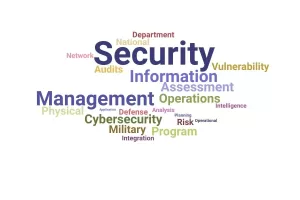Table of Contents
Introduction
As technology becomes increasingly integral to business operations, the need for robust cybersecurity managed security services for small businesses have never been more critical. Small businesses in the Raleigh, North Carolina area often struggle to find cost-effective solutions that provide adequate protection against cyber threats. This is where a leading Managed Security Services Provider (MSSP), steps in to bridge the gap and ensure the digital infrastructure of these businesses remains secure.
According to Kaspersky, a widely known Endpoint security company, “69% of businesses are planning to use MSPs and MSSPs in the next 12 months. Among the main drivers are a need for special expertise and improved cost effectiveness (41%)”
High-quality MSSPs understand the unique challenges faced by small businesses and offer tailored services to meet their specific needs. With a team of dedicated experts, they provide a comprehensive range of services, including compliance and risk assessments, vulnerability and penetration testing, and ongoing security monitoring and management. By partnering with an MSSP, small business owners can have peace of mind, knowing that their cybersecurity is in capable hands.
What Is A Managed Security Service Providers (MSSP)?
According to Gartner, a leader in the space of technological research, “An managed security service provider (MSSP) provides outsourced monitoring and management of security devices and systems. Common services include managed firewall, intrusion detection, virtual private network, vulnerability scanning and anti-viral services. MSSPs use high-availability security operation centers (either from their own facilities or from other data center providers) to provide 24/7 services designed to reduce the number of operational security personnel an enterprise needs to hire, train and retain to maintain an acceptable security posture.”. One thing that often catches people unaware, though, is that An MSSP is NOT the same thing as a Managed Services Provider (MSP). Read on for the key differences when considering what’s best for your business.
Advantages & Components of an MSSP
One of the key advantages of choosing an MSSP is the fixed monthly pricing plans they offer. This allows small businesses to budget their expenses more effectively, keeping their cybersecurity costs predictable and manageable. In addition, an MSSP provides static engagements, meaning businesses can access their services on a project basis, as well as ongoing services for businesses that require continuous monitoring and support.
For small businesses, remote monitoring and management are crucial components of an effective cybersecurity strategy. Small business managed services offer remote monitoring services, which enable their experts to identify potential risks and intrusions in real-time. This proactive approach to security allows businesses to address threats promptly, preventing potential damage to their infrastructure and data. An additional offering may also be general IT support, recognizing that small businesses often lack the internal resources to effectively handle their technology needs. This comprehensive approach ensures that businesses receive full-scale support for both their cybersecurity and IT requirements.
Another key advantage of partnering with a dedicated MSSP is their commitment to providing 24/7 services. Cyber threats do not sleep, and with a service provider, small and mid sized businesses have around-the-clock monitoring and support that they might not otherwise have and can rest assured knowing that their digital assets are protected at all times. This level of responsiveness minimizes downtime and potential losses that could result from a security breach. They will prioritize building long-term relationships with their clients, providing personalized support and continuously adapting their services to address emerging threats.

What are the differences between an MSP and MSSP?
Managed Service Providers (MSPs) and Managed Security Service Providers (MSSPs) both offer services that can be valuable to small businesses, but they focus on different aspects of IT management and security. Here’s a breakdown of the differences between MSPs and MSSPs in the context of small business investment:
- Scope of Services:
- MSP (Managed Service Provider): MSPs primarily focus on managing and maintaining a wide range of IT services and infrastructure. They handle tasks such as network monitoring, hardware and software maintenance, cloud services management, and general IT support. Their main goal is to ensure the overall efficiency and reliability of IT systems.
- MSSP (Managed Security Service Provider): MSSPs, on the other hand, specialize in cybersecurity services. They are specifically focused on protecting an organization’s digital assets from security threats and attacks. MSSPs offer services like threat detection, intrusion prevention, firewall management, penetration testing, vulnerability assessments, compliance assistance and incident response.
- Primary Objectives:
- MSP: The primary objective of an MSP is to keep IT systems running smoothly, minimize downtime, and ensure that technology supports the day-to-day operations of the business. They prioritize system availability and performance.
- MSSP: MSSPs prioritize security and risk management. Their main goal is to protect an organization’s data, networks, and systems from cyber threats and breaches. They focus on identifying, mitigating, and responding to security incidents.
- Investment Considerations for Small Businesses:
- MSP Investment: Small businesses often benefit from investing in MSP services, especially if they lack in-house IT expertise. MSPs can help improve operational efficiency, reduce IT-related downtime, and provide cost-effective IT support. This can free up resources for other business initiatives.
- MSSP Investment: For small businesses with sensitive data or industry-specific compliance requirements, investing in Managed Security Services may be crucial. Cybersecurity threats can be especially damaging to smaller organizations, so having experts in place to protect against these threats is essential. MSSPs provide specialized security services that help safeguard the business against data breaches and cyberattacks.
- Combined Services:
- Some service providers offer a combination of MSP and Managed Security Services, often referred to as Managed IT and Security Services (MSSP+MSP). This integrated approach can provide both IT infrastructure management and robust cybersecurity protection.

In summary, the choice between an MSP and an MSSP for a small business investment depends on the organization’s specific needs and priorities. If a small business needs comprehensive IT management and support, an MSP may be sufficient. However, if security is a top concern, especially in industries with stringent compliance requirements, considering the services of an MSSP or a combination of both MSP and MSSP services might be the right approach to ensure the business’s long-term success and security.
What are some typical offerings provided by an MSSP?
Offerings between different Managed Security Service Providers (MSSP) can vary widely, depending on the expertise of the company. Some focus solely on compliance initiatives like framework assessments, risk assessments, audit preparation, etc. Others focus on security assessments like vulnerability scans, penetration testing, or social engineering tests. Then there are others that focus strictly on managed services like endpoint security, agent based checks, SOC as a Service, or other ongoing engagements. That being said, there are “typical” offerings, which are outlined below.
Key services offered by MSSPs typically include:
- Threat Detection and Monitoring: Managed Security Services continuously monitor an organization’s network and systems for signs of suspicious or malicious activity. They use advanced security tools and technologies to identify and respond to potential threats.
- Intrusion Detection and Prevention: MSSPs deploy intrusion detection systems (IDS) and intrusion prevention systems (IPS) to detect and mitigate unauthorized access attempts and attacks in real-time.
- Firewall Management: MSSPs manage and configure firewalls to ensure that network traffic is properly filtered and that only legitimate traffic is allowed through while blocking potential threats.
- Vulnerability Management: They assess an organization’s IT infrastructure for vulnerabilities and provide guidance on how to remediate them to reduce the risk of exploitation.
- Security Information and Event Management (SIEM): MSSPs use SIEM tools to collect, correlate, and analyze security data from various sources to identify and respond to security incidents effectively.
- Incident Response: In the event of a security breach, MSSPs provide incident response services, helping organizations contain and mitigate the impact of the breach and recover from it.
- Security Consulting and Advisory: MSSPs often offer cybersecurity consulting services to help organizations develop and implement effective security strategies and policies.
- Compliance Management: They assist organizations in meeting regulatory and compliance requirements by ensuring that security measures align with industry standards and legal mandates.
- Security Awareness Training: Some MSSPs offer employee training programs to educate staff about cybersecurity best practices, reducing the likelihood of human error leading to security breaches.
- Managed Endpoint Security: MSSPs manage and secure endpoints (e.g., laptops, desktops, mobile devices) to protect them from malware, ransomware, and other threats.
Factors to use when deciding on an MSSP partner
When a small business is considering partnering with a Managed Security Service Provider (MSSP), it’s essential to make an informed decision to protect your company’s digital assets and data. Here are key factors to consider.
- Expertise and Experience:
- Assess the MSSP’s experience in providing security services to businesses of your size and industry. Look for expertise in your specific sector, as regulatory requirements and security challenges can vary.
- Services Offered:
- Determine the range of services offered by the MSSP. This could include threat detection and response, vulnerability management, firewall management, antivirus solutions, and more. Ensure they provide the specific services your business needs.
- Scalability:
- Consider whether the MSSP can scale their services as your business grows. A flexible provider can adapt to your changing security needs.
- Compliance Expertise:
- If your business must adhere to specific regulations (e.g., GDPR, HIPAA), ensure the MSSP has expertise in compliance requirements and can help you maintain compliance.
- Security Technologies:
- Evaluate the technologies and tools the MSSP uses. Are they up-to-date and effective in countering modern threats? Ensure they have access to cutting-edge security solutions.
- Response Time:
- Inquire about the MSSP’s response time to security incidents. Rapid response is crucial to minimizing damage during a cyberattack.
- Monitoring and Reporting:
- Understand their monitoring capabilities. Ask about the frequency and detail of reports you will receive. Transparent reporting is vital for assessing the effectiveness of their services.
- Service Level Agreements (SLAs):
- Ensure that the MSSP offers SLAs that meet your business’s needs, including response times, resolution times, and uptime guarantees.
- Customer References:
- Request references or case studies from their current or past clients to gauge their satisfaction and the provider’s track record.
- Cost Structure:
- Understand the MSSP’s pricing model. Is it subscription-based, pay-as-you-go, or customized to your needs? Ensure there are no hidden fees.
Remember that selecting an MSSP is a significant decision for your business’s security posture. Take your time to thoroughly vet potential partners and consider seeking input from IT professionals or consultants with cybersecurity expertise to ensure you make the right choice. Keep reading for a value analysis and financial metrics to use for when you’re ready to move forward.
How do I determine when hiring an MSSP makes sense?
We have an entire article dedicated to determining when hiring an MSSP makes sense, but keep reading to learn more about typical pricing structures to get an idea of pricing models and what they look like in practice. Generally speaking, most MSSPs will provide quotes based on the number of users or devices being managed, by a selected plan, or perhaps tiers of service, with each having their own benefits and drawbacks. One note is that the below numbers have a wide range because it heavily depends on what feature(s) are included – fewer features will be a lower cost, more features will be more expensive. Luckily, here at EkoCyber we offer our clients the best of both worlds and you can check our our plans and services to get an idea of how we incorporate our pricing.
User based pricing
User based pricing is based on paying a set fee per user in your organization, regardless of how many endpoints. You pay the same amount for 1 employee that has 1 associated device, as you would for 1 employee who has 50 associated devices. This is great for companies with limited personnel, but have an expansive endpoint or server environment.
Typical costs for this range between $75 – 175 per user.
Device based pricing
Devise based pricing is the opposite of user based pricing. This is based purely on the amount of endpoints managed, regardless of users in the company. This might make sense if your organization only needs a specific amount of devices managed, only needs a specific network monitored, or has a large employee count with relatively few devices.
Typical costs for this range between $10 – 200.
Plan based pricing
Plan based pricing can be useful to consolidate multiple services into one comprehensive offering at a set price, regardless of devices or employee count (for the most part). Managed Security Service usually will have a range of employees/devices and have a set price for that range that lands somewhere in the middle, with hefty discounts. An example might be if a service is meant for 1 – 25 employees that could cost $10 – 250 per month, but the set price is $175. This is great for several reasons, including no-hassle licensing for growing companies, and no surprise bills at true-up time. However, if you’re significantly under that size (lets say 5 devices in this example) it might make more sense to do just pick and choose the services for a lower rate.
Single service based pricing
This is the most straight forward pricing plan – you pick exactly what you want based on their catalogue, and they will provide a static quote for that service. This can be great to augment existing services, but can be tricky if you need multiple services, since the prices can add up quickly and often don’t contain incentive pricing that other plans might.
Cost Breakdown & Value Analysis of Using an MSSP
The cost of building a basic in-house security team consisting of a Security Manager, a Security Engineer, and a Security Analyst can vary widely based on factors such as location, experience, and the specific responsibilities of each role. However, below is a simplified example, using approximate average annual salaries in the United States as of September 2022:
FTE Employee Cost Breakdown
- Security Manager:
- Average Annual Salary: $120,000 to $150,000
- Responsibilities: Overseeing the entire security program, developing security policies, managing the team, and interacting with senior management.
- Security Engineer:
- Average Annual Salary: $90,000 to $130,000
- Responsibilities: Designing, implementing, and maintaining security infrastructure, conducting vulnerability assessments, and responding to security incidents.
- Security Analyst:
- Average Annual Salary: $70,000 to $100,000
- Responsibilities: Monitoring security systems, analyzing security data, investigating incidents, and assisting in security operations.
Please note that these salary ranges are approximate and can vary significantly depending on factors such as location (salaries tend to be higher in major metropolitan areas), industry, and the level of experience and expertise of the individuals hired.
To calculate the total annual cost of this security team, you would add up the annual salaries for each role:
Total Annual Cost = Security Manager Salary + Security Engineer Salary + Security Analyst Salary
So, for this example:
Total Annual Cost (Avg. Salary) = $135,000 + $110,000 + $85,000 = $330,000
This simplified calculation provides an estimate of the annual personnel cost for a basic in-house security team with one manager, one engineer, and one analyst. Keep in mind that additional costs, such as benefits, training, equipment, and any other relevant expenses, should also be considered when budgeting for an in-house security team.
Software Cost Breakdown
So we’ve established the personnel cost for a basic dedicated security team can range from $280,000 – $380,000 with an average of $330,000. Next you’d need to include software and hardware cost for things like; antivirus, vulnerability scanners, penetration testing software, compliance automation, firewalls, log aggregators/SIEM, intrusion prevention software, and the list goes on. This can range from $20,000 for small businesses with fewer than 50 people, upwards of $150,000+ for larger enterprises. The average annual expenditure for most businesses falls in the middle, around $75,000.
This brings the new annual cost up to an average of $405,000 to have a basic fully staffed and equipped in-house security team. If you wanted to cut down to the bare bones, a company could still expect to pay an average of $150,000 for just a Security Manager and basic security software for a company of 50 employees, or an average of $12,500 USD/mo (not including employee benefits and taxes).
For comparison, if you use the average price per employee from above as many MSSPs charge @ $125/user, that comes in at $75,000/yr or $6,250/mo. That’s a savings of 50% without factoring other items. Note that there are many outliers and this isn’t a simple black and white equation but can serve as a general basis.
Finally, we will tackle the elephant in the room. All of that is well and grand, but how does a small business justify spending thousands of dollars a month, when there’s little return in the form of additional revenue or marketability? The answer is simple: it’s an insurance policy against bad actors and your potential clients will have less reservations about you handling their highly sensitive personal information.
According to IBM’s Cost of a data breach 2023 report, the average impact of a data breach on organizations with fewer than 500 employees is $3.31 million. If you paid an average of $75,000 to an MSSP to protect your organization, it would take 44 years to hit the breakeven point of just 1 data breach.
Don’t let your cyber security be your businesses Achilles Heel. Make the move to invest in success with a reputable MSSP.





